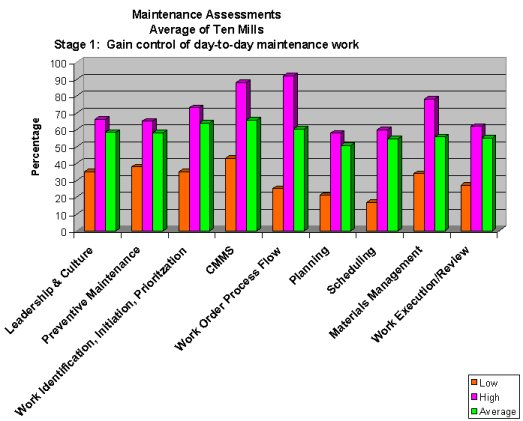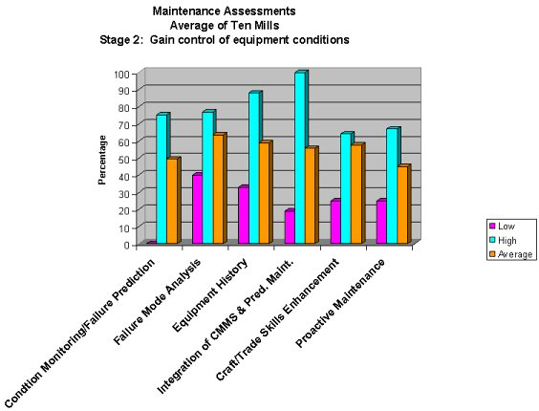Maintenance Standards at Weyerhaeuser Company
Pat DiGiuseppe, Weyerhaeuser
Are you Meeting your Highest Maintenance Standards?
The maintenance impact on manufacturing results has traditionally been measured in terms of cost. As equipment reliability became a focus area in our industry, the strategic value of maintenance effectiveness became apparent to business leaders. For mill leaders, this brought the dilemma of balancing a need to reduce costs with an expectation that reliability must improve. From a total corporation view, wide disparity among site results establishes the need to lead and support change in maintenance performance. It is this kind of variability among sites that provides the opportunity to improve performance.
High performing sites typically deliver superior equipment reliability on a consistent basis. Maintenance processes are good to excellent and sustained over time even with leadership changes. This strength can usually be traced to the “built in” processes owned by the organization and capable of withstanding changes in personnel to a great extent. Underperforming sites have great difficulty accepting the discipline applied to maintenance practices at the best performing sites. Culture and NIV characteristics often prevent them from reaching their full capability. The strategy to accomplish this in a multi-mill system is the challenge faced today by most manufacturing companies.
At Weyerhaeuser, a Maintenance and Engineering Council was established over 20 years ago to provide a means of learning from each other. Members were the site leaders for both disciplines. Contact between sites included annual meetings, benchmarking visits and some resource sharing. Improvements were made but became difficult to build upon and sustain. However relationships were built during this period that laid the groundwork for the ability to transfer Standard Maintenance Practices.
With support from the top of the Company, leaders in wood products and pulp/paper together established an agenda for the Council which set priorities for a three year period. The basics were identified as critical to building a solid foundation for maintenance excellence. First among them is the partnership necessary between maintenance, operations and materials management. Without this in place, efforts to achieve improvement inevitably lead to conflict and wasted energy. This aspect of equipment reliability performance is often overlooked leaving mill functional units to independently work toward improvement while treating each other with an internal “customer/supplier” mentality. When supported by a site manager or corporate leader, this is a self defeating approach leading units to compete and challenge each other for results without responsibility for cost or site wide impact.
Ownership of total manufacturing by all team members including maintenance excellence is not well recognized in our industry. The concept of a strong partnership to optimize total manufacturing is a key foundation element for success. This partnership includes joint accountability for results including maintenance costs and equipment reliability shared by operations, maintenance and materials management.
Effective planning and scheduling was identified as key to building and sustaining results. It is essential and requires strong organizational commitment before other aspects of maintenance excellence can be successful. It must be viewed as an equipment reliability process, not just maintenance management.
Defect elimination through failure analysis was identified among early priorities. It also requires a discipline in the mill organization that is difficult to sustain. Maintenance historically is measured and rewarded by the ability to react to failures quickly. While response is important, analysis and defect elimination are more critical however are often viewed as time consuming and of little value in organizations with poor reliability performance.
Other maintenance standards are being established for technical and maintenance management practices.
Owners (from the Council) were identified for each standard practice and a team of experts from various sites were commissioned to draft the key elements for each practice. This approach established ownership and credibility among the mills. Company leadership support was and continues to be essential.
Sustaining effective practices through leadership changes and market fluctuations is challenging in our industry. Publishing the standards does not guarantee effective implementation and improvement over time. For this reason, an assessment tool was developed to audit mill status and provide recommendations for improvement.
Teams are formed utilizing maintenance and engineering leaders across the Company to carry out the process. Results are combined and presented to measure trend improvement and provide each site with a snapshot of their level of performance versus our best and average scores. The visual impact is convincing to site leadership teams looking for useful maintenance benchmarks. Summary results from ten mills are attached.
Assessments will be conducted on two year cycles with follow up support from leadership in the interim. Maintenance standards and processes are utilized across the Company for manufacturing support including wood products and pulp/paper. Corporate and mill personnel combine to support implementation and assist in problem resolution.
Pictured below is a graphic summary of assessment results from ten mills showing the expected weakness in planning and scheduling performance. This initial data forms for results tracking over time.


Related Articles

How to Fix the 70/30 Phenomenon

Zen and the Art of Managing Maintenance

Why do maintenance improvement initiatives fail to deliver? (Hedgehog or Fox?)

Why Maintenance Improvement Efforts Fail

TPM and RCM: Whirled Class

Where Do Maintenance Professionals Come From?




